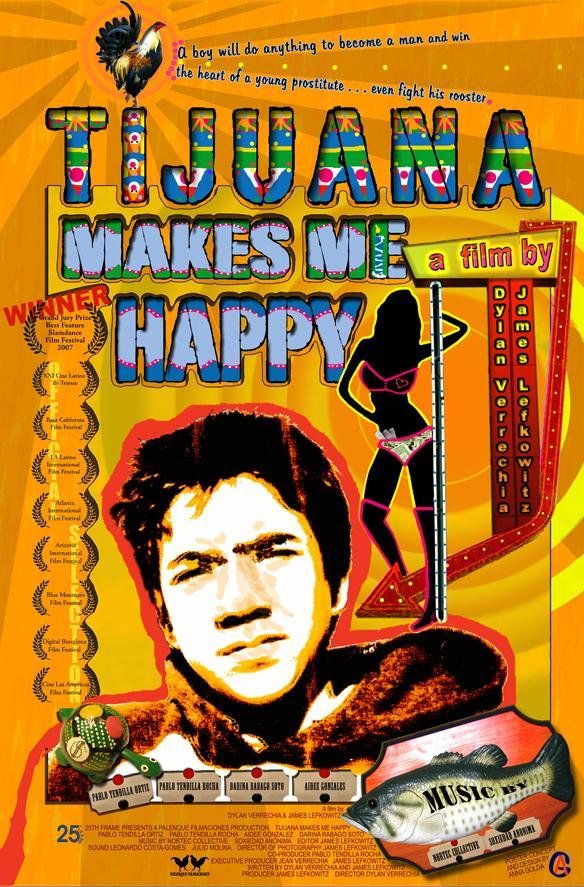
Tijuana Makes Me Happy
PART I OF THE TIJUAS TRILOGY
Every man remembers how hard it is being 14 years old: Your voice is cracking, your hormones are raging, school is boring, the girl you love is a young prostitute who won't go out with you because you don't have enough cash, so you start smuggling drugs across the border in order to save enough money to buy a rooster so you can enter a cockfight and win her love. It's a tale as old as time itself.
“Tijuana Makes Me Happy” is both a charming coming-of-age story and a celebration of the most infamous of all Mexican border towns. It's also a subtle criticism of society's lust for money and success and the lengths to which people will go to attain both. For the film's hero, Indio, the city's red-light district is a siren's song of erotic mystery. While just across the border – the "other side" – lies a world of boundless economic possibility. In the middle resides Indio's loyalty to his underemployed but decent father, Jhonny. Which to choose? Which to choose?
This South Park comedy style of a group of street brats is the first installment in the Tijuas trilogy, recipient of the Grand Jury Prize for Best Feature Film at Slamdance, the Indie Max for Best Feature at the San Antonio Film Festival, and screened at Marché du Film at Cannes Film Festival, LALIFF, and the San Diego Latino Film Festival.
Cast & Crew
Writer/Director/Producer: Dylan Verrechia
Executive Producer/Cinematographer: James Lefkowitz
Jhonny/Production Manager: Pablo Tendilla Rocha
Assistant Producer: Allison Albino
Sound Mixer: Leonardo Costa-Gomes
Sound Mixer: Julio Molina
Title: Rafael Saavedra
Indio: Pablo Tendilla Ortiz
Aidée González: Rebecca
Music: Pepe Mogt, Nortec Collective, Lila Downs, Banda el Recodo de Luz, Soxiedad Anónima
Press
At the IFC Center by Becky Wie
In an era of reality television shows that feel even more scripted and formulaic than the latest Hollywood romantic comedy, it is easy to be cynical about the capacity of today's film and television industries for genuine storytelling. More often than not when the lights come up, we in the audience are left with the feeling that if art reflects life, then our particular existence is some off-kilter cross between the melodramatic and the ridiculous, with all the depth of Norbit and the pathos of American Idol.
I was rejuvenated when I left the IFC Center in New York City after seeing Tijuana Makes Me Happy, directed by Dylan Verrechia and produced by James Lefkowitz, which won the Grand Jury Prize for Best Narrative Feature at Slamdance in Park City this year. A coming-of-age story about a young boy growing to manhood in Playas de Tijuana, Verrechia and Lefkowitz's film is an invigorating fusion of fiction and reality that rises to the challenge of powerful storytelling and fun, innovative film-making.
"Tijuana Makes Me Happy" is all the more compelling because the actors in the film are actual Tijuana residents essentially playing themselves. Jhonny and Indio are played by father/son duo Pablo Tendilla Rocha and Pablo Tendilla Ortiz. In real life, Pablo and Pablito live with the rest of their family--a mother and two sisters--but they do a marvelous job channeling the friction and co-dependence of a father and son alone together in the world, trying to negotiate each other's needs and expectations. In fact, there are no professional actors in the cast, and the scenes are refreshingly authentic as a result.
With subdued pacing and un-staged shots of the Tijuana red-light district at night, the morning ceremony at a local school, the ever-expanding development of bright pink houses where the families live, and the local slums, the film has a documentary sensibility that is enlivened by the carefully constructed story the characters live out.
What it lacks in sharpness, "Tijuana Makes Me Happy" more than makes up for in sincerity and pizazz. The title song will be stuck in your head for weeks, and the poignancy of Indio's adolescent struggle and redemption never fades. That Verrechia and Lefkowitz have succeeded in creating a universally appealing Tijuana-based tale at a time when the American government and countless citizens regularly denounce people from south of the border is an accomplishment and a contribution.








